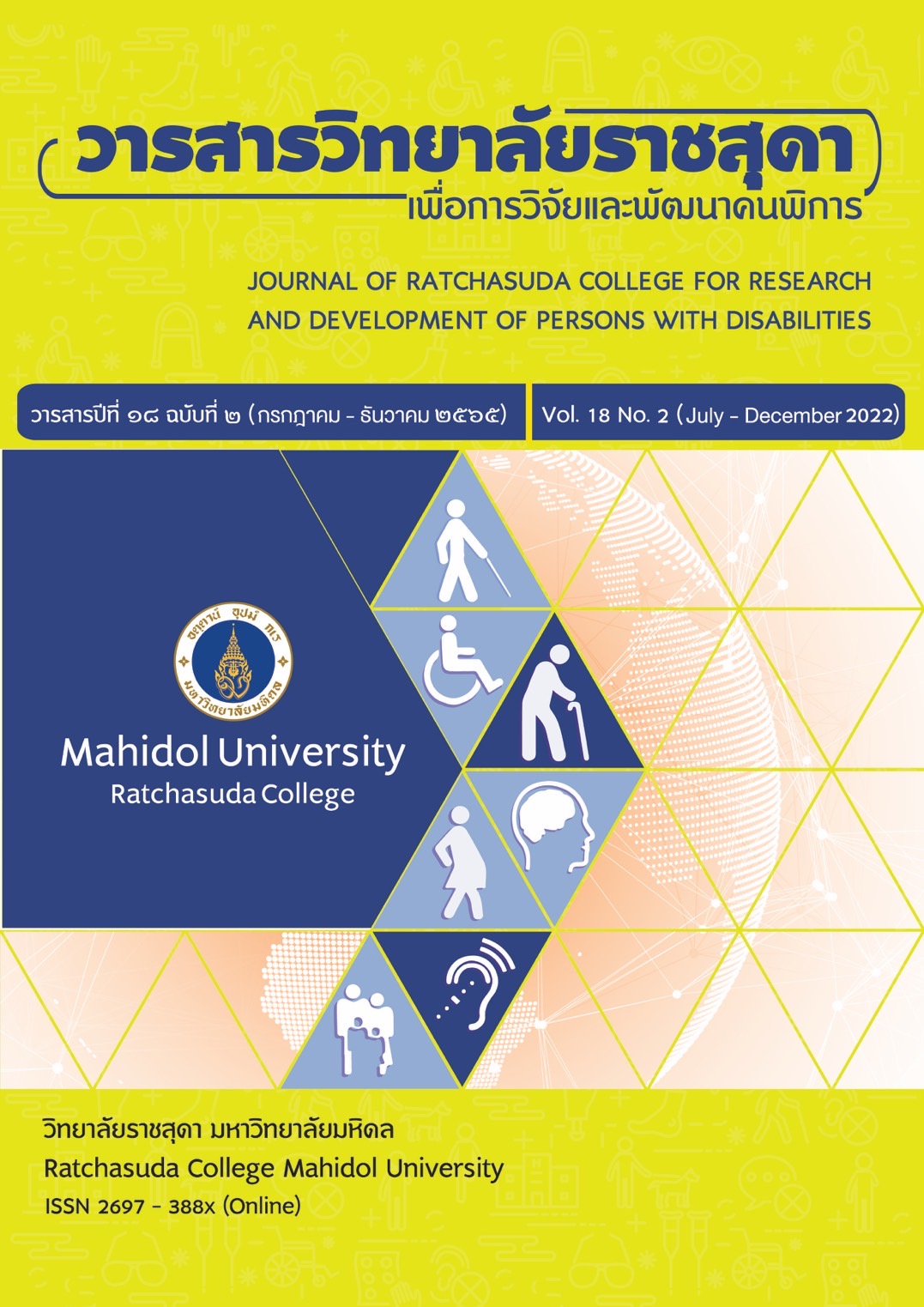การวิเคราะห์องค์ประกอบเชิงยืนยันของแบบวัดความเข้มแข็งทางใจ ของคนพิการทางการเคลื่อนไหว
Keywords:
Confirmatory Factor Analysis, Resilience, Person with Physical DisabilitiesAbstract
This study aimed to analyze the resilience factors among the person with physical disabilities using the confirmatory factor analysis the sample were 202 people with physical disabilities attending rehabilitation services at a Sirindhorn National Medical Rehabilitation Institute. The resilience scale has 21 questions the research instrument was a resilience scale, based on Wagnild and Young’s concept (1993) with a reliability of 0.928 and a content validity of 0.90 Descriptive statistics was based on SPSS. While the confirmatory factor analysis was grounded in Mplus. The results disclosed the confirmatory factor loading of resilience model consists of 5 factors was An Equanimity (0.747), A Perseverance (0.842), A Self-reliance (0.869), A Meaningfulness (0.964) and An Existential aloneness (0.823). As the result, this resilience scale and measurement model of the resilience among person with physical disabilities has shown the quality of an appropriate scale.
Downloads
References
Aitken, L. M., Chaboyer, W., Kendall, E., & Burmeister, E. (2012). Health status
after traumatic injury. Journal of Trauma and Acute Care Surgery, 72(6), 1702-1708.
Boonvas, K., Supanunt, T., Chunhabordee, A., & Wae, N. (2017). Caregiver
Stress and Needs in Caring Disabled. The Southern College Network Journal of Nursing and Public Health, 4(1), 205-216.
Curtis, J. W., & Dante Cicchetti. (2003). Moving research on resilience into the
st century: Theoretical and methodological considerations in examining the biological contributors to resilience. Development and Psychopathology, 15(3), 773-810.
Department of Mental Health, (2008). Ministry of Public Health, Report Of
Enhancing Resilience. Quotient of the mental illness personnel. Bangkok: The Ministry of Public Health.
Egeland, B., Carlson, E., & Sroufe, L. A. (1993). Resilience as process.
Development and psychopathology, 5(4), 517-528.
Erica, S. E., & John, H. (2015). Resilience in Ageing. Arizona Center on Ageing.
The University of Arizona.
Fisher, M., King, J., & Tague, G. (2001). Development of a self-directed
learning readiness scale for nursing education. Nurse Education Today, 21, 516–525.
Gooding, P. A., Hurst, A., Johnson, J., & Tarrier, N. (2012). Psychological
resilience in young and older adults. International journal of geriatric psychiatry, 27(3), 262-270.
Grotberg, E. H. (1995). A guide to promoting resilience in children:
Strengthening the human spirit. (Vol. 8). The Hague: Bernard van leer foundation.
Hair, J. F., Black, W. C., Babin, B. J. & Anderson, R. E. (2010). Multivariate Data
Analysis. (7th ed.). NJ: Prentice Hall.
Hengudomsub, P. (2007). Resilience in later life. Thai Pharmaceutical
and Health Science Journal, 2(1), 115-123.
Lee, B. O., Chaboyer, W., & Wallis, M. (2008). Predictors of health‐related
quality of life 3 months after traumatic injury. Journal of Nursing Scholarship, 40(1), 83-90.
Nintachan, P., Vanaleesin, S., Thummathai, K., & Orathai, P. (2011). Resilience
and Thai Youth Risk Behavior. Rama Nurs J, 17(3), 430-443.
Parayat, C., Kangchai, W., & Somanusorn, S. (2016). Predictive Factors of
Resilience among Elderly. The journal of Nursing Burapha University. 24(2), 97-106.
Phimphakarn, K., Prasertsin, U., & Srichannil, C. (2019). The effects of an
Integrative Individual Counseling to Strengthen the Resilience of Widows from the Conflict Zone in the Southern Border Provinces. Journal of Research and Curriculum Development, 9(2), 284-307.
Phimphandee, W. (2019). The empowering resilience among the elderly in
eastern economic corridor according to Buddhist principles. Journal of MCU Peace Studies, 7(3), 737-752.
Phimphandee, W. (2019). The Factor Analysis of Elderly Resiliencein
Eastern Economic Corridor. Journal of Nursing, Public Health, and Education, 20(1). 77-89.
Vahia, I. V., Depp, C. A., Palmer, B. W., Fellows, I., Golshan, S., Thompson, W.,
... & Jeste, D. V. (2011). Correlates of spirituality in older women. Aging & mental health, 15(1), 97-102.
Wagnild, G. M, & Young, H. M. (1993). Development and psychometric
evaluation of the resilience scale. Journal of Nursing Measurement, 1(2), 165-178.
Downloads
Published
How to Cite
Issue
Section
License
Copyright (c) 2022 JOURNAL OF RATCHASUDA COLLEGE FOR RESEARCH AND DEVELOPMENT OF PERSONS WITH DISABILITIESบทความที่ได้รับการตีพิมพ์เป็นลิขสิทธิ์ของวารสารสถาบันราชสุดาเพื่อการวิจัยและพัฒนาคนพิการ






